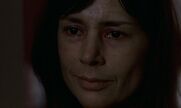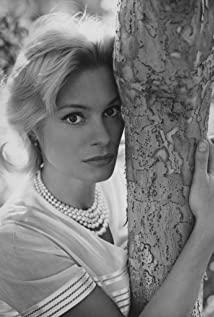The story is very "one-line". Sister Agnes was terminally ill, and the two sisters, Maria and Karin, left everything behind and took turns to wait at the bedside. In Agnes' eyes, death may not be so scary, she just wants to take the opportunity of "waiting to die" to dissolve the estrangement and indifference that have accumulated between the sisters for many years. However, Agnes's efforts are often in vain, no matter physically or mentally, her only intimate object can only be the silent maid Anna.
One morning, Agnes, who had just woken up from the pain, saw Maria sleeping on the couch not far away, and the corners of her mouth could not help but lift slightly. However, this smile was not recorded in her diary, she wrote: "Monday morning, I was in pain..." It can be seen that Maria's intimacy cannot match Agnes' physical pain. In addition to enduring heart palpitations, sweating, and all kinds of uncomfortable physical reactions, Agnes had to deal with the mental pain the sisters brought on.
Maria and Karin, who were circling the sickbed, only had bodies, and their troubles were the deep problems on their shoulders. As the beloved daughter of her parents, the beautiful Maria not only attracted the jealousy of her sisters from childhood to adulthood, but also swayed between her husband and the doctor's lover. One night when Anna's daughter is ill, she seduces her old lover, David, but she refuses. The next day, the husband attempted suicide after learning about it. David, who reunited many years later, dragged Maria to the mirror and said, "You may be more beautiful now than you were before, but I want you to know how you've changed. Now your eyes are no longer sharp and you care about trivial things. You You used to be aggressive and unabashed. Your lips showed dissatisfaction and desire, but were gentle... Your beautiful, broad forehead now has four wrinkles on each eyebrow, now in the light No, I can see it during the day..." Ingmar Bergman, borrowing the doctor's words, cruelly told Maria that the reasons for changing her were indifference, laziness, and burnout. This focused portrayal, at the level of "the state is born from the heart", disenchanted "time" and dusted "love", showing the ephemeral nature of purity and sincerity, and Maria will eventually be greedy and lustful. Destroyed into another Maria. However, Ingmar Bergman also pointed out the equality of "time tampering with everything", why is the doctor standing beside Maria not indifferent and selfish?
Maria, played by Liv Ullman, is charming, frivolous and flamboyant. The older sister Karin is played by Swedish film star Ingrid Turin, who has her own awe-inspiring and invincible goddess charm. In the movie, she is always gloomy and gloomy and refuses warmth. She's stuck in an "everything is a lie" marriage. During dinner, Karin accidentally smashed her wine glass, and was greeted with a cold look by her businessman husband, Joe Jim. She went into the bedroom and, in unstoppable pain, stabbed her body with glass fragments. This behavior reveals the extreme pain of desire that has nowhere to relieve.
The essence of Ingmar Bergman's films almost all point to the indifference and estrangement between modern people. He discovered the "dead wall" between them, which cruelly blocked friendship, love, and even three. Affection between sisters. Karin faced Maria's outstretched hands with fierce eyes: "You can't touch me, and no one can!" Maria refused to touch Agnes's hands, the dead air and mold made her at a loss. First think of yourself selfishly.
If it is said that the inability to communicate between people is the biggest symptom of modern people, can we try to talk and listen? It's a pity that Ingmar Bergman dashed our illusions. In the film, the superficial Maria tried to get Karin off the shackles of indifference and returned to a harmonious and normal sisterhood. However, how unreal the "intimacy" of that night was in hindsight. In the eyes of the "awakened" Karin, Maria's behavior was almost a botched performance. How can she convince herself to embrace intimacy, friendship and loving-kindness without stepping out of her broken autistic self-image?
I think that Maria has no introspection, and she has to force herself to be greedy and frivolous from David's scalpel-like words. Karin is overly introspective, indulging in the double self-suicide game of the spirit and the body, searching for the reason for the broken self again and again. Maria or Karin's painful confession can almost be said to be the "substitute" opinion of director Ingmar Bergman. Agnes has him in his body, and Maria and Karin also have them. he. He instigated a few young ladies and asked each viewer: Why do we find our loneliness, the estrangement from others, and the curse of desire, but we are still so cowardly and stupid, and can't find that fragrant path of communication?
The shots of "Shouting and Whispering" rarely involve the outdoors, and focus more on the private space of the three sisters' lives. He omits the "outside" lives of the sisters, and confines the film to Agnes' dying period. "middle. The film's title "Shouting and Whispering" made the director's intention even more clear. He used the different "shouting" and "whispering" of several characters to dig out the mental illness of modern people. Countless shouts from Agnes's hospital bed gave the viewers an extremely sharp pain. Karin screeched nervously, telling others that she was a self-loathing woman. Mary's cry probably because the inner world of accusing others can be easily stirred?
Also, impressive is the use of color blocks in this color film. The three main color blocks of red, white and black are presented, giving the viewer an extremely strong visual impact. The characters' desire, distress and anxiety are all highlighted by the large area of positive red. White robes, white bed curtains, and white roses all set off Agnes' pale face and inner world. And black makes the viewer lead to the darkness and subtlety of the human heart. Karin often wears a slim black robe, rustling between the rooms, making people feel her gloom and cold all the time. It is not difficult to see that red as the theme color makes the director's narrative space more full and inflated, overwhelming the audience's acceptance. The collision of red and black first produces a visual collision, which is reflected to the audience as a psychological collision, making the director's intention always fluctuate between motion and warmth. After Agnes passed away, everyone wore black mourning clothes, which once again allowed the viewer to experience that "everyone is an island", and the silent dead wall among people chills the back.
In fact, when we no longer doubt the sincerity and depth of Ingmar Bergman, we will also see a group of Maria and Karin around us. As the director himself said, he never made that kind of deadly "boring film", he always strived to make his films full of moving power. Therefore, he appeared in the image of the only warm-colored character Anna in "Cry and Whisper", which made people feel a little gentle comfort after repeatedly tasting indifference.
As the only source of warmth for the dying Agnes, Anna finally assumes the imagination of warmth and intimacy. When Agnes was in pain, Anna undressed to soothe her panic with a warm body. And when Agnes, who was finally "resurrected from the dead", was rejected by her own sisters, Anna persevered again and hugged her "child" Agnes like a Virgin.
Anna held Agnes on one end of the human seesaw, so that Karin, Maria and others on the other end achieved a certain balance in terms of both the importance of roles and the warmth of the world. Anna in the film is taciturn, her only plea is dedicated to God. Besides, she doesn't shout or whisper, she is the most normal looking person, and in her plump body hides the rarest truth, goodness and beauty in modern people. Because of her status, she has no platform to communicate with Maria or Karin, and is a "dumb" who has no right to speak in the whole family. However, her rich inner world is fully revealed through her actions and eyes. After praying silently, she sat down and quietly nibbled an apple. She took off her clothes and hugged the frail Agnes tightly. She stared blankly at Jojim's indifference to Karin. In this black hole-like family, she is just a noble giver, relying on her pure and kind nature to heal Agnes' wounds little by little. For her own pain of bereavement and loneliness, her only object of appeal is God. Agnes-Anna-God, it's a complete chain of redemption. Furthermore, Anna's near-natural intimacy with Agnes is a "true sister" affection that Karin and Maria will never release.
Agnes finally "slept" in Anna's arms, which made the viewer feel a slight warmth, but the viewer's mind couldn't help but ask: such "warmness" shouldn't belong to Karin and Maria give? At the end of the film, Anna expresses with self-respect once again: "I don't want anything." She took a note drawn from her husband's purse by the "gentle" Maria, and left the least valuable but the most valuable. Significance of Agnes' diary. In the last few days of staying in the "home" where Agnes was not, Anna lit a white candle, carefully opened the diary, and read it bit by bit: "Wednesday, September 3, a clear, silent sky , full of autumn air, how gentle and beautiful. My sisters Karin and Maria came to see me...like the old days, I felt better...we ran to the old swing laughing and we Sitting on it is like three good little sisters. All the pain is gone." The "image" here is used too accurately, allowing the viewer to see the illusory nature of the real moment of happiness, and can't help but sigh that the best times are left behind In the memory of the past, never come back...
View more about Cries & Whispers reviews











